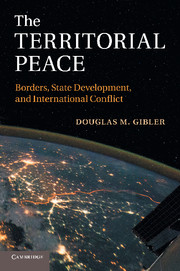Book contents
- Frontmatter
- Contents
- List of illustrations
- List of tables
- Acknowledgments
- 1 Introduction
- PART I INTERNATIONAL BORDERS
- PART II STATE DEVELOPMENT
- PART III THE TERRITORIAL PEACE
- 7 Territorial peace among neighbors
- 8 Territorial peace and negotiated compromises
- 9 Territorial peace and victory in conflict
- 10 Final thoughts
- References
- Index
10 - Final thoughts
from PART III - THE TERRITORIAL PEACE
Published online by Cambridge University Press: 05 October 2012
- Frontmatter
- Contents
- List of illustrations
- List of tables
- Acknowledgments
- 1 Introduction
- PART I INTERNATIONAL BORDERS
- PART II STATE DEVELOPMENT
- PART III THE TERRITORIAL PEACE
- 7 Territorial peace among neighbors
- 8 Territorial peace and negotiated compromises
- 9 Territorial peace and victory in conflict
- 10 Final thoughts
- References
- Index
Summary
Summary of findings
Territorial peace theory is broad and applicable to many different literatures. I have used the theory to explain important changes in domestic institutions, such as the rise of militarized states, the likelihood of party polarization across countries, and how both of these changes affect the number of veto players able to check the power of the leader. I have also used the argument to describe how domestic political behavior becomes centralized when a state is threatened and how these attitudes aid the centralization process.With changes in both the behavior and institutions of the state documented, I then explained how state centralization altered leader incentives and constraints during international conflict. All of these mechanisms have previously remained isolated fields of study that were, to varying degrees, plagued by inconsistent results. However, treated comprehensively, as interrelated processes, strong and consistent findings confirm the over-arching theory and its many implications. I use this chapter to review the empirical support for the process of state development and change described by territorial peace theory. I also discuss several key issues that these analyses raise.
Territorial threat and domestic politics
I argued that territorial threats to the state are more likely than other types of threats to be salient to targeted publics. I found support for this argument in several different places. First, the average individual is less likely to be tolerant of individuals in minority groups when the state is targeted by territorial threats.
- Type
- Chapter
- Information
- The Territorial PeaceBorders, State Development, and International Conflict, pp. 165 - 174Publisher: Cambridge University PressPrint publication year: 2012



